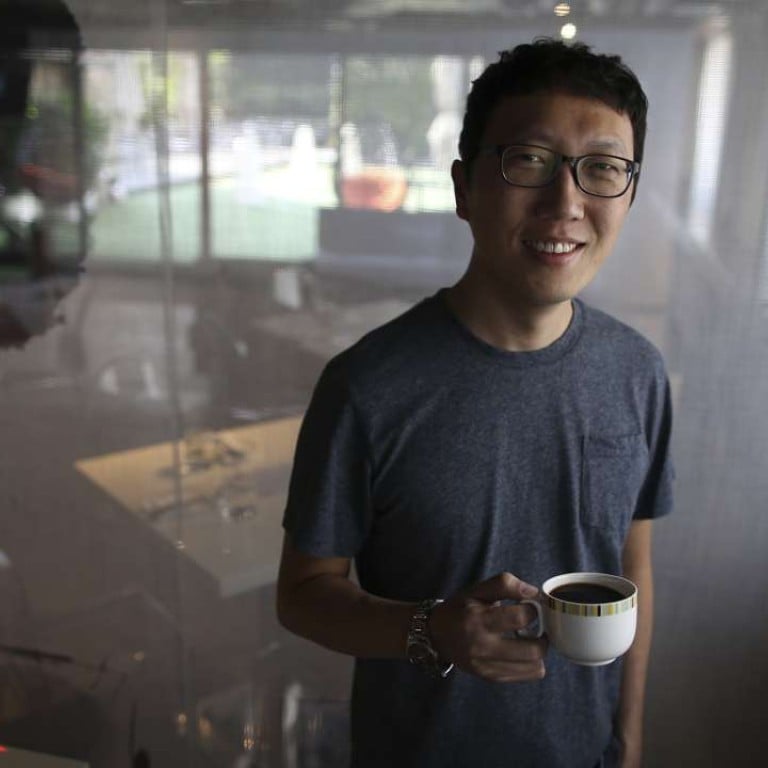
How At Cafe 6’s director Neal Wu turned teenage heartbreak into a successful career
Wu went from being just another lovesick student to one of Taiwan’s most successful youth romance writers. Now he’s released his first feature film
When his heart was broken by a girl in his class in his university days, Neal Wu Tzu-yun found himself holed up in an internet cafe, aimlessly playing computer games by himself. Once he realised that the negative emotions were not going away, he turned to distracting himself by reading fiction online. Before long, Wu began writing and posting his own stories on a BBS message board.
It turned out to be one of the best decisions he has ever made.
The native of Kaohsiung, Taiwan, will turn 40 this weekend. While Wu is still looking every bit like the gentle nerd that he likely once was, the industrial engineering and management graduate from the National Chin-Yi University of Technology has also been one of Taiwan’s most popular authors of youth romance in the past decade and a half.
“I had never thought that I was going to write novels – that was simply unimaginable then,” Wu reiterates his career’s accidental start when we meet in a cafe in Hong Kong’s Hung Hom district on a weekday afternoon in late August.
“At first, I was writing online as if I was keeping a diary for myself. I continued to write when I saw that many people had read my stories, and I soon got used to the process. About a year later, a publisher approached me and asked if I wanted to be published – it didn’t sound right. After my second novel, I started to wonder: “Is this for real? Or is this all a big lie?’ It was not [my goal] to be a novelist.”
Wu, also known by his internet nickname “Hiyawu”, is no longer just a novelist. The Taiwanese author was recently in town to promote At Cafe 6, a feature film that was adapted by Wu from his eponymous 2007 novel.

With its deceptively nostalgic portrayal of adolescent love, At Café 6 has been mentioned in the same breath as two recent romantic-comedy blockbusters in Taiwan – You Are the Apple of My Eye (2011) and Our Times (2015) – although audiences without prior knowledge of Wu’s coming-of-age novel would be staggered by the grimmer view on love and life in his new film.
“It has always been my intention for this film to tell a realistic story,” says Wu. “I didn’t want to include the exaggerated, overly romantic, and unrealistic forms of expression [seen in those two films]. This is a film that leans closer to reality [than fantasy]. It was decided even before I started shooting. The other approach simply doesn’t fit with my personality or habit.”
It’s presumably not Wu’s way to feign interest in his contemporaries’ work, either. When asked how he feels about the movie being compared to the two other successful films, he says: “I don’t have any feeling about this.”

Was You Are the Apple of My Eye – scripted and directed by fellow novelist Giddens Ko Ching-teng – an imaginary target when Wu prepared for his own project?
“I didn’t think about that. The focus shouldn’t be on this. It’s impossible to say that my anticipation would necessarily translate into success. Otherwise, I could just have spent all my time anticipating, and I wouldn’t have to put in so much effort to make the film,” Wu says with a laugh.

Wu insists that it is a “huge misunderstanding” for people to think that his decision to become a filmmaker was influenced by either Ko or Guo’s efforts. “As they made their [feature] films before me, it might look like I was following their lead. But that’s not the case,” he says.
“Filmmaking is something that I have wanted to do for more than a decade, but I wasn’t given a chance then. It was very hard to pull off: I had to find the investors by myself, and I had neither a manager nor any connections in the business. Giddens Ko has a manager, and that’s why he managed to find investors early.”

And then, he adds without prompting, “I’m confident in my own work. I think mine is better [than either].”

In a revelation that should come as no surprise to his readers, Wu says the one director he wishes to emulate is Japanese auteur Shunji Iwai: before he switched back to using his real name last year, Wu had published all his previous books under the pseudonym “Itsuki Fujii”, the name shared by two characters in Iwai’s classic 1995 film Love Letter.

At Cafe 6 opens on September 8
Want more articles like this? Follow SCMP Film on Facebook

